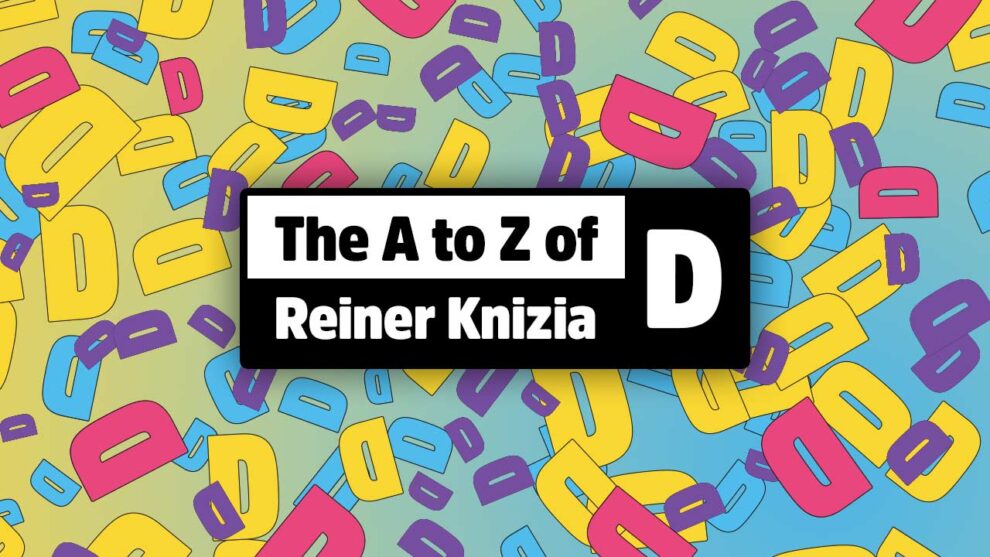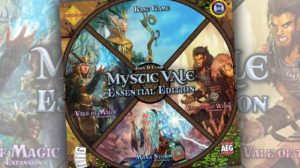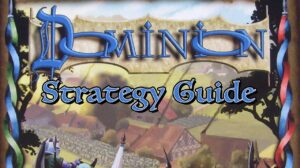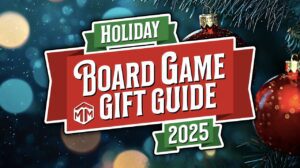The year 2025 marks the 40th anniversary of Dr Reiner Knizia’s career as a board game designer – his first published game, Complica, was released in a magazine in 1985 (although he’d self-published games before then as well).
Since then, Knizia has designed and published over 800 games and expansions, many of which are critically acclaimed. Put simply, Reiner Knizia is the landscape on which all other modern designers build their houses.
To celebrate Knizia’s career and back catalogue, Meeple Mountain are taking things back to basics to consider the ABC of Reiner Knizia: one game for each of the 26 letters of the alphabet.
This time: The Letter ‘D’.
D – Don’t L.L.A.M.A. Dice (2021)
L.L.A.M.A. is Knizia’s 2019 Spiel des Jahres nominated card-shedding game and it’s a great alternative to UNO, with players trying to get rid of the numbered cards and llamas from their hands. As Andy Matthews, Meeple Mountain founder and quick-card-game-superhero, says in his review of L.L.A.M.A: “the gameplay is where Llama shines; it’s light enough that you can play while chatting with your tablemates, but offers just enough decision space that you never feel as if you’re just laying down the next card in your hand”.
L.L.A.M.A.’s success has been astonishing for a very simple card game, surprising everyone. “It is very difficult to predict how well a game will perform,” said Knizia in an interview with the Dutch media outlet Spellengek, “On the one hand, there are games that have become much more successful than I expected. For example, I did not expect LAMA to become so successful and even be nominated for the Spiel des Jahres. And on the other hand, I am “of course” very disappointed that some of my other amazing games have not taken over the world!”
Whether the success is down to its accessibility, speed, gameplay, rainbows or the llamas themselves, how could we not celebrate the game that prompted Knizia to dress up as a llama for the Spiel des Jahres award ceremony!
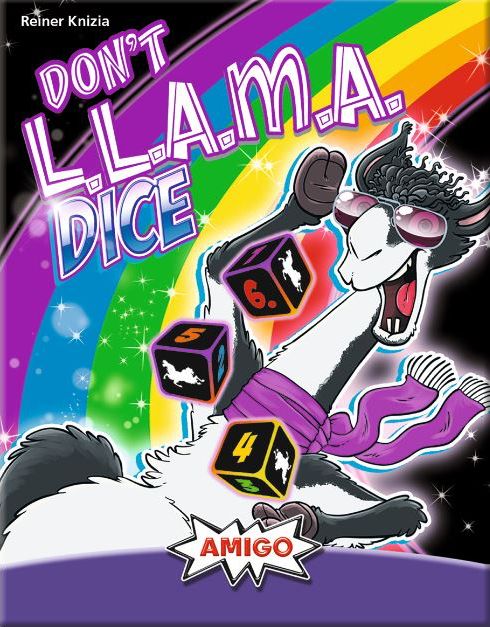
Whilst the design isn’t as streamlined as its camelid-themed parent, Don’t L.L.A.M.A. Dice retains L.L.A.M.A.’s charms. It leans more heavily on pushing-your-luck: players roll dice hoping to match cards and can choose to pass and bank their score instead of risk collecting more points. Plus, any game that contains a ‘Llama Drama’ phase deserves recognition!
Whilst the original game is more successful, Don’t L.L.A.M.A. Dice has its supporters who feel that it’s the stronger design. Whilst discussing the game, Mike DiLisio and Chris Yi of The Dice Tower point out that the dice version has more decisions for players to make on their turns whilst retaining the lightness and speed. “The sign of a good push-your-luck game,” said Yi, “is when you are really invested in someone else’s turn, not really for any particular reason but just because it’s fun.” Neither was a huge fan of the original and both rate Don’t L.L.A.M.A. Dice to be far superior, saying with concern that the ‘L.L.A.M.A.’ name might turn people away who didn’t enjoy the original.
The roots of that L.L.A.M.A. name aren’t as straightforward as you might imagine. Lama is German for llama and an acronym for ‘Lege Alle Minuspunkte Ab’ (translated as ‘discard all minus points’). Of course, for the English-language edition of the game, just ‘L.A.M.A.’ would look like a spelling mistake, so the additional ‘L’ was added to the name. The game’s title is therefore an acronym in the German edition but in the English edition it’s just a word for everyone’s favourite mammals.
For the dice version of the game the simplest thing would have been to call it ‘L.L.A.M.A. Dice’, however Llama Dice is the company of Spanish game designers Sheila Santos and Israel Cendrero (designers of the excellent The Red Cathedral and The White Castle). To avoid confusion, the acronym Don’t L.L.A.M.A. Dice was used for the English-language dice reimplementation: Don’t Let Llamas And Markers Accumulate. That’s being said, even for an acronym Don’t L.L.A.M.A. Dice is a bit of a mouthful and our personal favourite name for the game is the Iberian edition: LAMA Rock & Roll.

Whilst there are only 4 species in the Lama genus (the domestic, vicuña, guanaco and the two alpaca breeds), the L.L.A.M.A. family is still growing. A Party edition with a new pink llama and pink 20-point chips was released in 2020 and L.A.M.A. Kadabra released in 2024, an expanded and fractionally more complicated version of the original game.
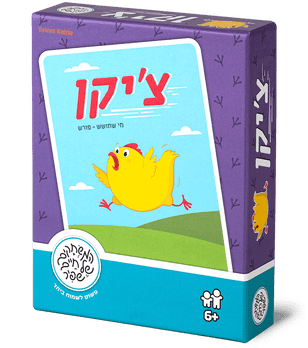 The most curious family member, however, is the simplified Hebrew reimplementation released by Shafir Games that answers that frequently asked question: ‘when is a llama not a llama?’ This version of the game is suitable for children ages 6 years and up, and spurns the magnificent llamas for… chickens. Titled צ’יקן (‘Chicken’ in English), it’s another Knizia title featuring chickens, although these are the cute, just hatched variety rather than the usual ‘funny fowls’ from games like Schotten Totten.
The most curious family member, however, is the simplified Hebrew reimplementation released by Shafir Games that answers that frequently asked question: ‘when is a llama not a llama?’ This version of the game is suitable for children ages 6 years and up, and spurns the magnificent llamas for… chickens. Titled צ’יקן (‘Chicken’ in English), it’s another Knizia title featuring chickens, although these are the cute, just hatched variety rather than the usual ‘funny fowls’ from games like Schotten Totten.
Discovering Droves of the Doctor’s Delightful Designs
They might not include llamas but there are plenty of Knizia ‘D’ games that are worth being aware of. Here are some that we think deserve deliberation:
Dice Games Properly Explained – We love the gloriously superior attitude of the title of this 1999 book. Between its covers, Knizia ‘properly explains’ the rules, odds and strategies of almost 150 traditional and Knizia-original dice games. Whilst his prose isn’t fancy, it’s a clear and engaging book and with a handful of bones the odds are good that you’ll find something to get you rolling along.
Digging / Desperados – We mentioned at the top that Reiner Knizia’s first ever published game was in a magazine in 1985, but it took until 1990 before he had a boxed game physically produced by a publisher. In a move that would signal things to come in his career, 1990 saw not one but two physically published games (the gold-themed Digging and Goldrausch) as well as a book on tactical games (Neue Taktikspiele mit Würfeln und Karten – ‘New tactical games with dice and cards’). Digging is regarded as Knizia’s first published boxed game and is a partnership card game that was rereleased as Desperados in 2009.

Drachenhort – Ever thought that the most exciting part of Clank! should be running away from the awakened dragon rather than tiptoeing about? If so then Drachenhort, released the year before Clank!, is the game for you. In this 2015 Knizia game each player is secretly backing three of the fleeing adventurers, steering them to safety (via gems!) whilst trying not to let the other players know which adventurers they want to win – you can’t outrun a dragon but you can outrun your opponents and sabotage is a viable option! Subsequently reimplemented as 2022’s Treasures of Nakbe, this is a silly family game that makes the ‘tired roll-and-move mechanic’ interesting.
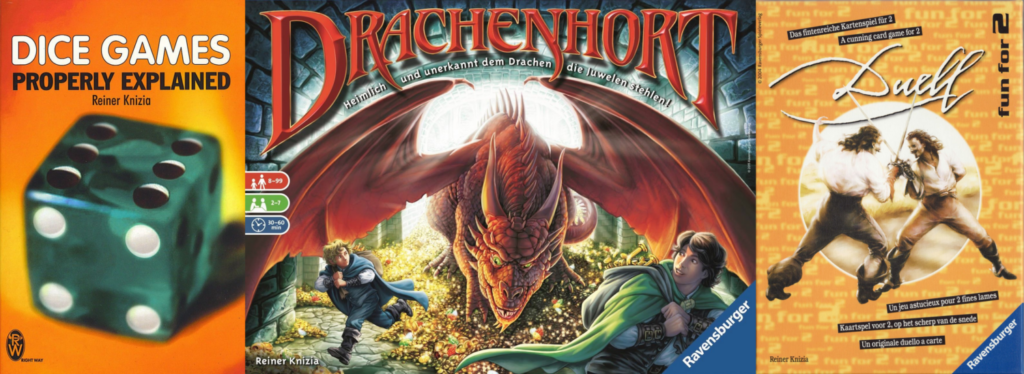
Duell – This two-player card game of feints and thrusts is an update of 1993’s En Garde and, if we’re honest, lacks the drama and production of its ancestor. Blank wooden meeple, a plain battle ground and dull cards are a far cry from the metal minis and fun, energetic art of the original. Switching things up in 2004’s Duell, however, are new special cards that change the rules of each duel, making it a toss up between whether you want thematic excitement or gameplay variation. We know which one we’d prefer!
–
And the ‘D’s are done! What do you think, did we do the doctor down or determine the definitive draft? What ‘D’ game would you have chosen? Let us know in the comments below and check out the rest of the Reiner Knizia Alphabet here!


